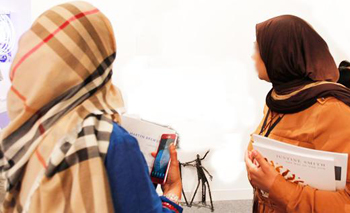Jeddah, Oct 21: The Education Ministry in coordination with the Labor Ministry has moved to facilitate the legalizing of the statuses of expatriate teachers working in international schools. It will be done through registration with the “Ajeer Service” of the Labor Ministry.
 All international schools were sent a notice to the effect by Mohammed bin Abdullah Al Murshid, director general of education and training, Riyadh region on Dhul Hijjah 22.
All international schools were sent a notice to the effect by Mohammed bin Abdullah Al Murshid, director general of education and training, Riyadh region on Dhul Hijjah 22.
The administrators and employees of international schools have welcomed the move as it will legalize their statuses.
The Ajeer Service aims to curb the visa trade and reduce the number of workers who run away from their sponsors as well as protect their rights, those of the establishments and the individual sponsors.
The ministry said in the notice that male and female teachers working in international and public schools should register themselves with the service to avoid breaking the law.
It further said that spouses can work under the same sponsors in the same schools but they need to register with the system so that they have a certificate or authorization to show Labor inspection teams on their routine rounds.
Padma Hariharan, director & head of Novel International Group of Institutions, said that the notice mentioned that a sibling or family member can also sign up for a job in the same school through the Ajeer Service website. “However, those who already have a job at the same school but have not registered with the Ajeer Service will be considered in breach of the Kingdom’s laws,” she observed.
A family member can be verified by submitting his documents to the ministry as mentioned by the MOE. The ministry has ordered schools to have their employees registered with the Ajeer Service. This includes those employees who have already obtained permission to work with the Ministry of Education following interviews.
However, employees without permission certificates will have to attend an interview with the ministry and have their files reviewed.
“Employees need to be verified by the ministry for their jobs. The advantage of the law is that if both spouses are working for the same employer, they will be more comfortable and happier. However, the downside is that if one of them loses his job, then everyone including the children or siblings who are employed in the same establishment will also have to forgo their jobs,” Hariharan noted.
She added that she was happy that the MOE had taken both perspectives into consideration and was focusing on both quality and productivity while at the same time trying to generate maximum employment from every family.
The doctor thanked the ministry officials for working out a law which stood to benefit the expatriates in the Kingdom and prayed that talented, qualified and trained expatriate housewives would take this opportunity to serve the education sector to groom future leaders.
The MOE’s move comes at a time when the Kingdom is actively trying to streamline the employment sector with regards to both citizens and expatriates.
As a large number of international schools depend on expatriate teachers who are dependents for the most part, it was considered important to regularize their status so that they can work legally in the Kingdom.





Comments
Add new comment